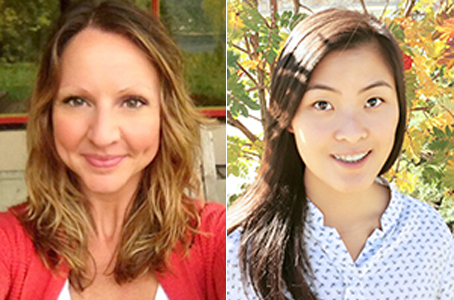
Study participants suggest how to reduce patients’ fears and anxiety when accessing health care system.
During their residencies at St. Paul’s Hospital in Downtown Vancouver, Dr. Erin Cusack and Dr. Rannie Tao were completing long-term electives at Vancouver Coastal Health’s Three Bridges Community Health Centre when they both noticed that many of their patients were suffering from chronic pain conditions and feeling that their needs were not being met by the health care system. What was striking to both of them was the sense of hopelessness among those patients.
“We both independently became interested in what might affect these patients in terms of giving them a more positive experience and more hope in getting through their chronic pain,” says Dr. Cusack, who now practices at South Hill Family Health Centre in Vancouver.

“We were seeing that patients who had strong sources of hope had a different perception of pain than those who didn’t feel they had sources of hope or support; with increased support, their pain level could decrease,” adds Dr. Tao, who is now a general practitioner in Calgary.
Dr. Cusack and Dr. Tao decided to explore the topic further as their resident research project and developed a study to explore how patients’ perceptions and experiences of hope affected their pain and illness experience. Exploring the role of hope in patients’ illness experience with chronic pain: a qualitative study comprised in-person interviews at Three Bridges with five patients, most of whom had co-existing addictions or mental health issues or were part of a marginalized population.
The researchers found that the strongest themes that emerged from patients’ responses were around their experiences accessing the health care system.
Patients expressed that they felt fear or frustration when accessing the health care system while living with chronic pain, which stemmed from a perception of inadequate treatment of pain by doctors and a lack of understanding of patients’ needs.
On the other hand, the patients also shared that having a relationship with their physician was very important and was also a potential source of hope and healing in their illness experience. Seeing a physician who they felt really listened and expressed empathy helped them feel more hopeful and optimistic, ultimately making their chronic pain experience less severe.

“It was interesting that even though most of the patients were able to describe a lot of negative experiences, they almost universally also recognized that there were positive experiences,” says Dr. Cusack. “Just having a therapeutic relationship with their health care provider could be a real source of support and healing for them.
“Even in having ongoing, brief, 10-minute appointments – that’s still perceived as significant in many patients’ lives especially when they have a chronic illness.”
Other overlapping themes that emerged from their study included the need to maintain a positive attitude and optimism, which gave patients the strength to keep moving forward through their chronic pain. They also expressed having adequate social supports as an important source of hope and that prayer and meditation were also helpful.
For Dr. Cusack and Dr. Tao, the study serves as a reminder to physicians that creating that therapeutic alliance with their patients with chronic pain can make a significant difference in their lives.
“We’re so busy as family doctors and have to get through everything in the run of a day with seeing so many patients, paperwork, and so on, but it was really interesting to hear patients say just how significant they found even their brief interactions with their doctors and what an impact that had on them.”
Dr. Tao adds that, “Even if sometimes medical evidence or medication cannot take away their pain, that time that the physicians took to listen to them had been so helpful in giving them the hope necessary push forward in their journey with pain.”


